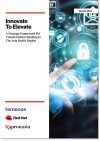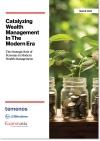Latest Insight
- Why cash is still prevalent in Asia
- Japan steps up green finance efforts
- South Korea charts middle path on crypto
- Should Grab and GoTo merge?
- Singapore pushes ahead with fintech-driven sustainability
- Digital banks in South Korea continue to thrive
- Billease is the rare profitable BNPL firm
- Fintech sector in Pakistan faces mounting challenges
- Where digital banks in Asia can make a difference
- Cashless payments jump in Vietnam
Latest Reports
-
Innovate to Elevate
 In the dynamic and diverse financial landscape of the Asia-Pacific (APAC) region, banks are at a pivotal juncture, facing the twin imperatives of innovation and resilience to meet evolving consumer expectations and navigate digital disruption. Catalyzing Wealth Management In The Modern Era
In the dynamic and diverse financial landscape of the Asia-Pacific (APAC) region, banks are at a pivotal juncture, facing the twin imperatives of innovation and resilience to meet evolving consumer expectations and navigate digital disruption. Catalyzing Wealth Management In The Modern Era Hyper-personalized wealth management presents a paradigm shift from traditional models relying on static, generalized segments. Developing tailored investor personas based on psychographics, behaviours and fluid financial goals enables financial institutions to deliver rich and tailored customer experiences that resonate with next-generation priorities. Navigating the Future of Fintech in Asia
Hyper-personalized wealth management presents a paradigm shift from traditional models relying on static, generalized segments. Developing tailored investor personas based on psychographics, behaviours and fluid financial goals enables financial institutions to deliver rich and tailored customer experiences that resonate with next-generation priorities. Navigating the Future of Fintech in Asia Although fintech has been a global phenomenon, nowhere has the combination of finance and technology been as impactful as in Asia. This report examines some of the key fintech trends that have been re-shaping Asia’s financial industry thusfar as well as examine the trends that will shape the future.
Although fintech has been a global phenomenon, nowhere has the combination of finance and technology been as impactful as in Asia. This report examines some of the key fintech trends that have been re-shaping Asia’s financial industry thusfar as well as examine the trends that will shape the future.
Events
| April 23, 2024 - April 25, 2024 Money 2020 Asia 2024 |
| October 21, 2024 - October 24, 2024 Sibos Beijing |
| November 06, 2024 - November 08, 2024 Singapore Fintech Festival |
In the emerging world of super apps, Japan's Line is something of an anomaly. It is neither a wholly domestic phenomenon like China's WeChat nor global like the U.S.'s WhatsApp. It is not a ride-hailing app like Singapore's Grab or Indonesia's Go-Jek. Rather, Line is a quirky messaging app beloved in its home market of Japan as well as in Taiwan and Thailand, where Japanese culture has enduring appeal, and to a lesser extent in Indonesia. Outside of those markets, it is virtually unknown.
WeChat has proven that a messaging app can become a digital wallet and that the road to monetization runs through fintech. Line aims to show that such a platform is viable regionally in Asia. Because Japan remains attached to cash, Line cannot rely on its home market alone. “Fintech itself is a proven monetized model, the only problem is how fast we can secure a meaningful size of users,” Line co-CEO Shin Jung-ho told Bloomberg in a June interview.
Virtual banks are coming to Singapore, but the biggest incumbents have little to fear. Singapore's top three lenders, DBS, UOB and OCBC, have plenty of cash to invest in fintech innovation. What they cannot build independently they can access through tie-ups with startups. For smaller lenders who lack the heavyweights' resources, the virtual banks could pose a tougher challenge. The scope of the challenge will depend on how much freedom the Monetary Authority of Singapore (MAS) gives the new entrants.
Facebook's plans to launch its cryptocurrency Libra in the first half of 2020 have prompted a new round of discussions in China about the merits of virtual currency. If Libra, which is aimed at the enormous global market of 2.38 billion Facebook users (not including China, where Facebook is blocked), were to succeed and China had nothing comparable, it could be left behind in the next wave of digital financial innovation.At the same time, Beijing worries that Libra will further entrench the hegemony of the U.S. dollar. “If the digital currency is closely associated with the U.S. dollar, it could create a scenario under which sovereign currencies would coexist with US dollar-centric digital currencies,” Wang Hexin, research chief of the People's Bank of China, was quoted as saying by The South China Morning Post in a July report.
At a time where China’s financial institutions face increased competition from rising fintech companies, banks in China have been battling with fintechs for market share. The surge of fintech companies have facilitated the process of acquiring loans by providing consumers with an alternative to credit cards. They also do not exclude the unbanked population of the country which is a further competitive advantage for fintech companies. Therefore, banking segments efforts to outdo fintech has forced them to take riskier measures by expanding their lending platform to unsecured loans. Creating incentives for increased consumption has consequently resulted in a higher issuance of credit cards.
Taiwan has a fairly well developed financial industry. This small island has a population of only 24 million in total, but has access to more than 5,000 physical financial institutions. Customers, therefore, are able to enjoy all the banking services provided with ease. Plus, the interest rates on loans in Taiwan are extremely low with only 2.63% APR. The application for a fiduciary loan becomes relatively easy for office workers. Thus, FinTech derivatives such as P2P lending are not previously widely considered.
Imagine you are sick at midnight. You lay in the bed comfortably and consult your private doctor through your smart phone at home. They know your medical history perfectly and give you a personalized prescription online. You don’t need to go to the pharmacy. With a few clicks on an app you purchase drugs and they arrive at your doorstep within an hour and everything is seamless. This is not necessarily a futuristic movie, but rather - reality made possible by PingAn Good Doctor - the largest and artificial intelligence powered mobile medical platform in China.
With the launch of its cryptocurrency Libra, Facebook is diving headfirst into digital banking. The U.S. social-media giant can draw on its massive global network of 2.3 billion users as it forays into finance. Yet Facebook will not be introducing Libra to China, which has the world's largest number of internet users. China blocked Facebook a decade ago and has moved to cripple crypto to control systemic financial risk and discourage capital flight. If Libra is a success, being excluded from it could have major ramifications for China's fintech development. At the very least, Beijing's own fintech system would be further isolated from the rest of the world.
In April, the Hong Kong-based fintech startup WeLab quietly won the former British colony's fourth virtual-banking license. Founded in 2013 by ex-Citibank executive Simon Loong and two other partners, the company has steadily grown over the last six years. It now has 30 million customers in Hong Kong and mainland China as well as a staff 600 strong. The company expects to launch its virtual bank - named WeLab Digital - between October and January.
Hong Kong banking giant HSBC can no longer rest on its laurels: The virtual banks are coming. With its deep local roots and wealthy customer base, HSBC has long been the dominant retail bank in the city. With the arrival of internet-only banks backed by the likes of tech giants such as Alibaba and Tencent, HSBC faces serious native digital competition for the first time.
KoinWorks, Indonesia's largest P2P lending platform, has raised US$16.5 million in its Series B funding round, signaling strong interest for alternative lending sources in Southeast Asia's largest economy. Established in 2016, KoinWorks caters to the underbanked and unbanked alike in Indonesia, whose scant credit profiles do not sit well with traditional lenders.
More...
The Vietnamese mobile wallet Vimo and point-of-sale provider mPOS are merging to form a new entity called NextPay, which will seek to raise US$30 million to expand domestically and elsewhere in Southeast Asia. NextPay's objective is to combine online and offline solutions into one with Vimo as the online channel and mPOS as the offline one.
Korea's would-be challenger banks received a stern rebuke from the nation's Financial Supervisory Commission in May as the top financial regulator rejected applications for a virtual-banking license from Viva Republica-backed Toss Bank and Kiwoom Securities-backed Kiwoom Bank. The regulator found Toss's capital situation problematic and Kiwoom's plan unfeasible. Both Toss Bank and Kiwoom Bank could re-apply for internet-banking licenses later in the year.
Australia's banks are in for quite a fight if Morgan Stanley's new report is accurate. The U.S. investment bank estimates in its newest Australia In Transition report that digital wallets could capture US$22 billion of revenue that in a less digitized world would have gone to the banks. Morgan Stanley's advice for the banks is blunt: Up your digital game before it's too late.
With an eye on going public, Singapore's ride-hailing giant Grab needs to show profitability, or failing that, strong potential to be in the black soon. Serving as a high tech taxi or food delivery service no longer looks like it will be enough for investors. Instead, Grab wants to be a go-to digital bank. If Singapore regulators grant Grab a virtual-banking license, the company will be poised to test out its fintech hypothesis in its home market.
Chinese peer-to-peer lending firms, reeling from the crackdown on P2P business at home, are starting to look for new business overseas. The fledgling India market is of great interest to several Chinese P2P companies, including 9F Group, CashBUS, and WeShare, according to reports in India's English-language media. The Chinese firms are attracted by India's huge size, steady economic growth and relative easy of market entry.













